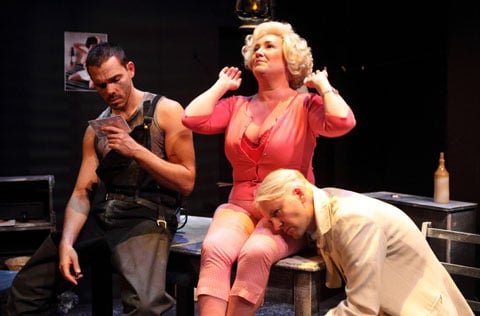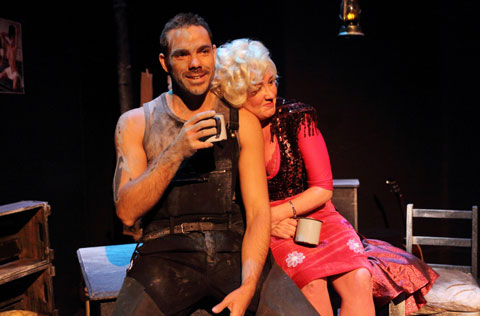Cape Town's Baxter Theatre kicks off 2014 with two award-winning plays that explore what it means to find your home in the world.
The first production is the darkly comic Kingdom of Earth (ends 22 February) by Tennessee Williams, writer of the Pulitzer Prize-winning A Streetcar Named Desire and Cat on a Hot Tin Roof. This rarely seen work, which is also known as The Seven Descents of Myrtle, began life as a short story that was later adapted into two versions of a play, as well as the 1970 film Last of the Mobile Hot Shots.
Set in 1960s Mississippi, it tells the story of two half-brothers fighting for ownership of their ancestral land. On the surface, they're polar opposites: Lot (Nicholas Dallas) is the sickly one while Chicken (Marcel Meyer) is somewhat of a sadistic brute. But a closer look reveals that both are outcasts - Lot because of his feminine nature and Chicken because he is multiracial - and that their battle for the family home is also about proving their worth as men.
Taking centre stage - often literally, as the two men spend most of the lengthy play at separate ends of the house - is Myrtle (Anthea Thompson), a former showgirl newly married to one brother but increasingly attracted to the other. The portrayal of a skittish and somewhat naïve woman, flung back and forth as a pawn in this domestic game, is practically flawless and well deserving of Thompson's Fleur du Cap Theatre Award nomination last year.
Common themes of racial inequality
This production's premiere, which also served as the company's international debut, took place at the Provincetown Tennessee Williams Theatre Festival in 2012. Audiences were so enthusiastic about the play that it was invited back last year and was staged together with The Milk Train Doesn't Stop Here Anymore, another one of Williams's obscure works.
The local run, staged at Cape Town's Artscape Theatre at the end of 2012, won the Fleur du Cap Theatre Awards for director Fred Abrahamse's shadowy set and received nominations for Marcel Meyer's contrasting costumes and Charl-Johan Lingenfelder's brooding musical score.
Part of this staging's success must be due to the common themes of racial inequality that South Africa shares with the Deep South. More than that, Williams has created a highly allegorical work. With an impending storm that threatens to flood the house and drown whoever isn't strong enough to make it to higher ground, Kingdom of Earth is captivating right to the bitter end.
An eccentric and unpredictable history teacher
The second production on show is Death of a Colonialist (ends 1 March), in Cape Town for the first time after two successful runs at Johannesburg's Market Theatre and one at the National Arts Festival in Grahamstown.
The play won the 2011 Naledi Awards for Best Production, Best Director, and Best Actor. Under the guidance of director Craig Freimond, whose TV highlights include Rhythm City and whose film credits include Jozi, the production is likely to receive further critical acclaim.
After his roles as the "villains" in Isidingo and Rhythm City, and one of the good guys in the recent film Mandela: Long Walk to Freedom, Jamie Bartlett makes a welcome return to the stage. His portrayal of an eccentric and unpredictable history teacher is one of the most captivating performances I've ever seen, especially when his passion for the amaXhosa has him covered in red ochre ("the blood of the ancestors") for a fiery speech.
A truly South African play
Shirley Johnston, in her 10th production for the Baxter Theatre and her 50th stage performance, plays the loving wife. Her decision to suffer in silence rather than share a painful secret that could shatter her husband's world - already crumbling given that his teaching techniques are having unintended consequences - communicates her inherent compassion, although it also leaves the couple together but alone as strangers under the same roof.
Completing the quartet are Ashleigh Harvey and Nicholas Pauling as the couple's children. After emigrating to the safer (but not necessarily greener) pastures of Canada and Australia, the pair return to their Grahamstown home from opposite ends of the world. Like many family reunions after a long time apart, this get-together includes humour in domestic scenes as well as the painful reopening of old wounds.
Greg Latter, returning to the theatre after 24 years of writing for the screen, has crafted a truly South African play. Death of a Colonialist digs deep as it examines the pain from our past and the fear for our future. Especially during Bartlett's lessons to an invisible classroom that probably doesn't realise how fortunate they are to have him, the discussion about the people of this land - the conquerors who rose and the conquered who fell; those who left and those who were left behind - explores what it really means to call a country your home.











































